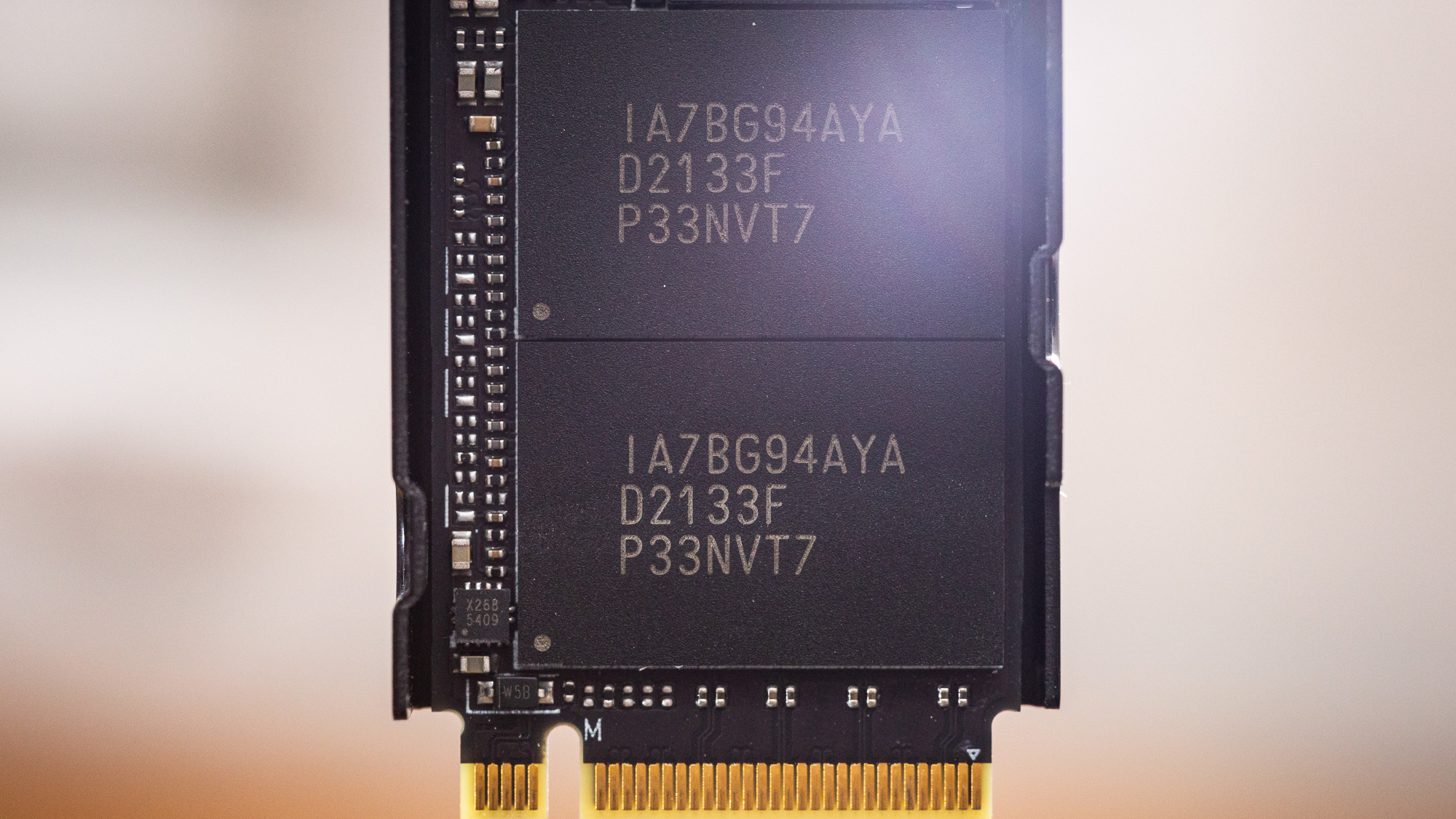Tom's Hardware Verdict
The Silicon Power XS70 is not special in any way, but it is priced right and has an attractive heatsink. It offers extreme performance and is more than capable as a gaming drive.
Pros
- +
Competitive Pricing
- +
High all-around performance
- +
Attractive heatsink design
- +
Good caching design with consistent performance
- +
+ PS5 Compatibility
Cons
- -
Heatsink is form over function
Why you can trust Tom's Hardware
Silicon Power’s XS70, also known as the XPower XS70, is rated up to 7.3 GBps of bandwidth, which is effectively the limit of consumer PCIe 4.0 SSDs. This drive is capable of up to 1 million IOPS, which matches expectations, and comes with a five-year warranty. Silicon Power markets the XS70 as a gaming drive, with specific attention given to the attractive aluminum heatsink.
Silicon Power is another third-party SSD manufacturer that also makes other products, predominantly flash-based drives that vie for a spot on our list of Best SSDs. The company's most popular SSDs are and were the P34A60 for budget or entry-level, and the perennial mainstream P34A80. The latter was one of the first SSDs based on the Phison E12 controller and it maintained the original hardware layout for a significant period of time. Eventually, it transitioned to using the Phison E12S or Silicon Motion’s SM2262EN controller. Such swaps are common in the industry, but this made the drive less desirable.
Still, the availability and reasonable pricing of the P34A80 put Silicon Power on the map. The company continues to produce mostly Phison-controlled drives, like the UD70 and US70, but the XS70 is certainly the premium part of their product stack.
Silicon Power positions it as a PlayStation 5 (PS5) option as we have seen from competing products, like the Kingston Fury Renegade and Inland Gaming Performance Plus, and it has the newest flash and an attractive PS5-compliant heatsink. The option of a 4TB capacity is nice, particularly because the Gaming Performance Plus doesn't come with this spacious option.
Let’s see if the XS70 measures up.
Specifications
| Product | 1TB | 2TB | 4TB |
|---|---|---|---|
| Pricing | $129.99 | $249.99 | $749.99 |
| Capacity (User / Raw) | 1000GB / 1024GB | 2000GB / 2048GB | 4000GB / 4096GB |
| Form Factor | M.2 2280 | M.2 2280 | M.2 2280 |
| Interface / Protocol | PCIe 4.0 x4 / NVMe 1.4 | PCIe 4.0 x4 / NVMe 1.4 | PCIe 4.0 x4 / NVMe 1.4 |
| Controller | Phison PS5018-E18 | Phison PS5018-E18 | Phison PS5018-E18 |
| DRAM | DDR4 | DDR4 | DDR4 |
| Memory | Micron 176L TLC | Micron 176L TLC | Micron 176L TLC |
| Sequential Read | 7,300 MBps | 7,300 MBps | 7,300 MBps |
| Sequential Write | 6,000 MBps | 6,800 MBps | 6,800 MBps |
| Random Read | 750,000 IOPS | 1,000,000 IOPS | 940,000 IOPS |
| Random Write | 1,000,000 IOPS | 1,000,000 IOPS | 1,000,000 IOPS |
| Security | N/A | N/A | N/A |
| Endurance (TBW) | 700TBW | 1400TBW | 3000TBW |
| Part Number | SP01KGBP44XS7005 | SP02KGBP44XS7005 | SP04KGBP44XS7005 |
| Warranty | 5-Years | 5-Years | 5-Years |
The XS70 is rated for sequential speeds of up to 7.3/6.85 Gbps read/write and 1 million random read and write IOPS, matching competing drives. The drive comes in 1TB, 2TB, and 4TB capacities. Pricing varies from $0.12-0.19 per gigabyte with the upper limit approached only with the 4TB SKU; this premium is typical, particularly with TLC. The pricing is quite competitive. if you search Silicon Power's spec sheets hard enough, you'll find that the endurance is rated for up to 700 TB of write data per TB of capacity (with the exception of 3PBW at 4TB).
As with all SSDs, there is an “up to” qualifier for performance metrics. It’s worth noting that sequential reads are taken from the native flash, in this case 3-bit MLC or TLC, while sequential writes come from the SLC write cache. Speeds are limited by the amount of interleaving, that is the amount of flash (NAND) dies available for parallelization, such that sequential writes, for example, should be lower at 1TB. Likewise these metrics may rely on a certain queue depth or level of threading, often at unrealistic values.
Therefore, the wise consumer should pay attention to overall hardware and design, which includes the mutability of hardware. That is to say, be aware that results are often under ideal circumstances that will vary in actual usage and, further, manufacturers may modify the hardware down the road.
Get Tom's Hardware's best news and in-depth reviews, straight to your inbox.
SP also informed us that the XS70 does not support TCG Opal. Self-encrypting drives (SED) can utilize AES-256 encryption to protect the contents through hardware. This includes an option for a cryptographic erase which throws away the key, being a faster option for a sanitize. Data can also be scrambled after this process.
While we do try to check for this support on drives, it’s worth noting that this feature, while optional for most controllers, is often not present on consumer drives. This can be for product segmentation but also because software encryption is often a preferred approach. For example, Microsoft removed SED support for Bitlocker back in late 2018 because poor firmware implementation allowed malicious decryption. This did require physical access. Worth noting here is that modern drives often have encryption in-flash as well, so attackers cannot access data by removing the physical NAND chips.
Software and Accessories
SP’s XS70 arrives in minimal packaging with no additional accessories. Software support is also nonexistent. This is not a huge deal for experienced users as they can rely on free software, for example CrystalDiskInfo (CDI) or Macrium Reflect Free. Also, gaming drives like this may end up in a console, so the lack of software may not be super important. Modern drives tend not to be reliant on firmware updates, although it is nice to have a SSD toolbox.
A Closer Look
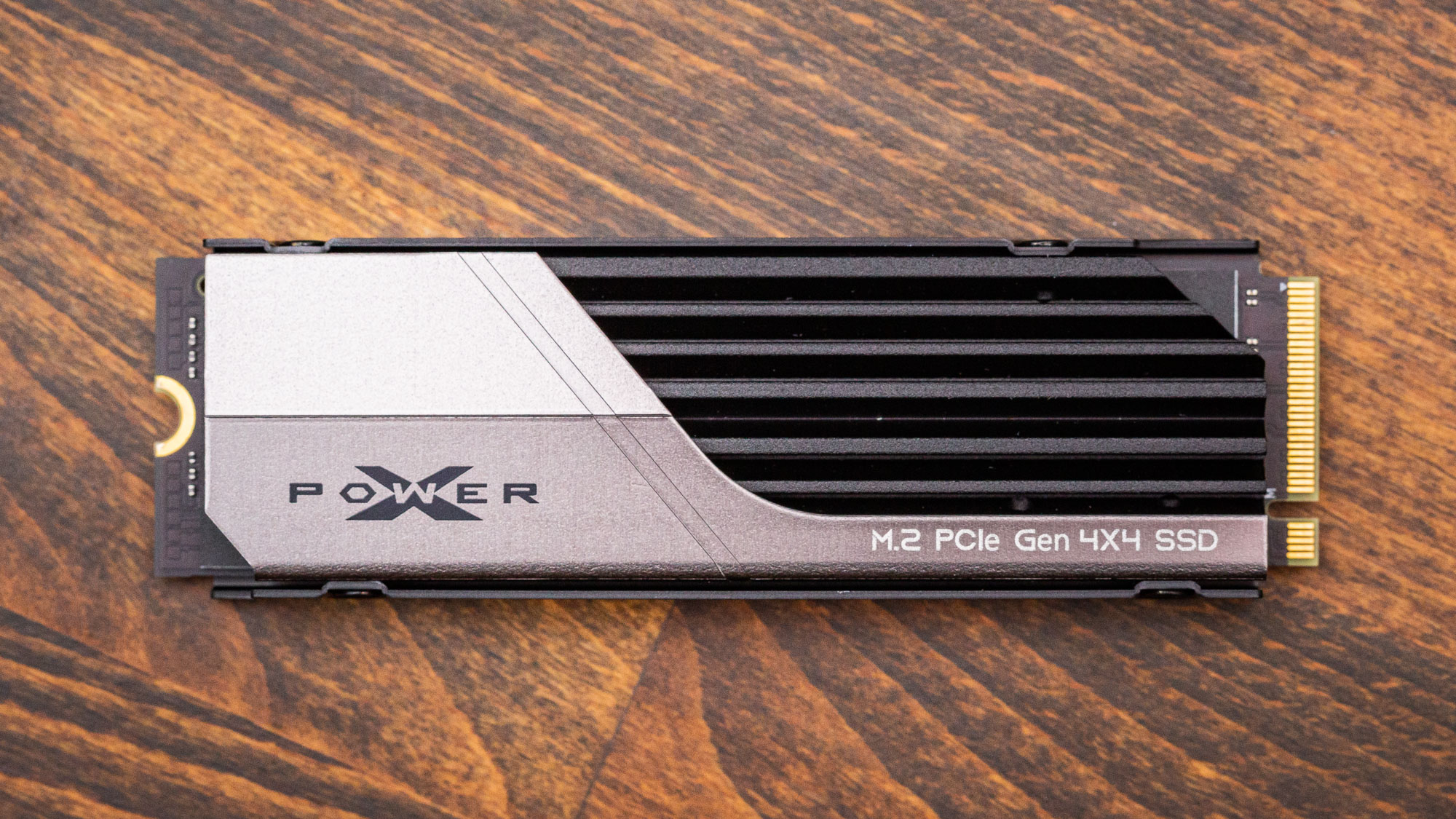
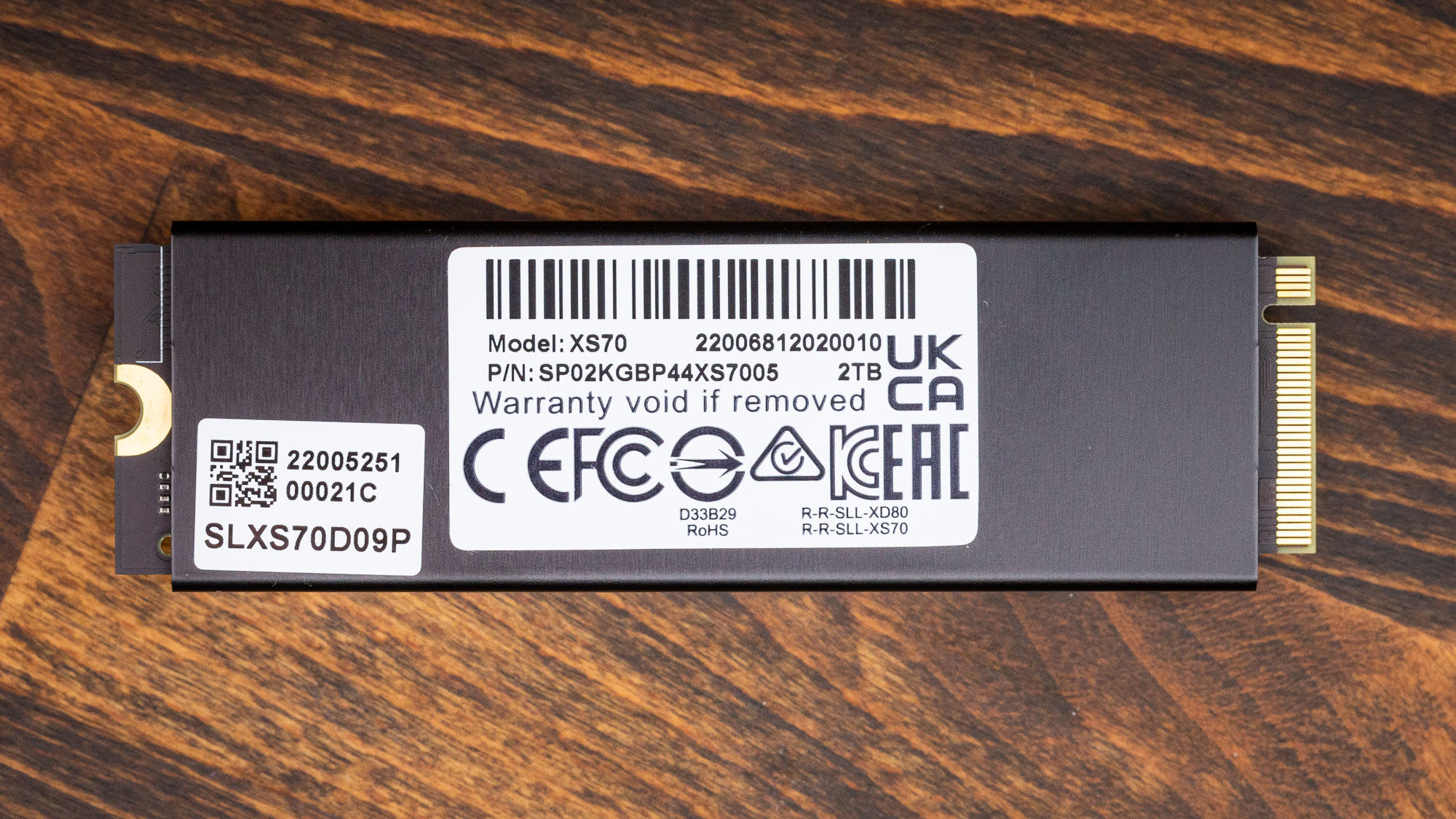
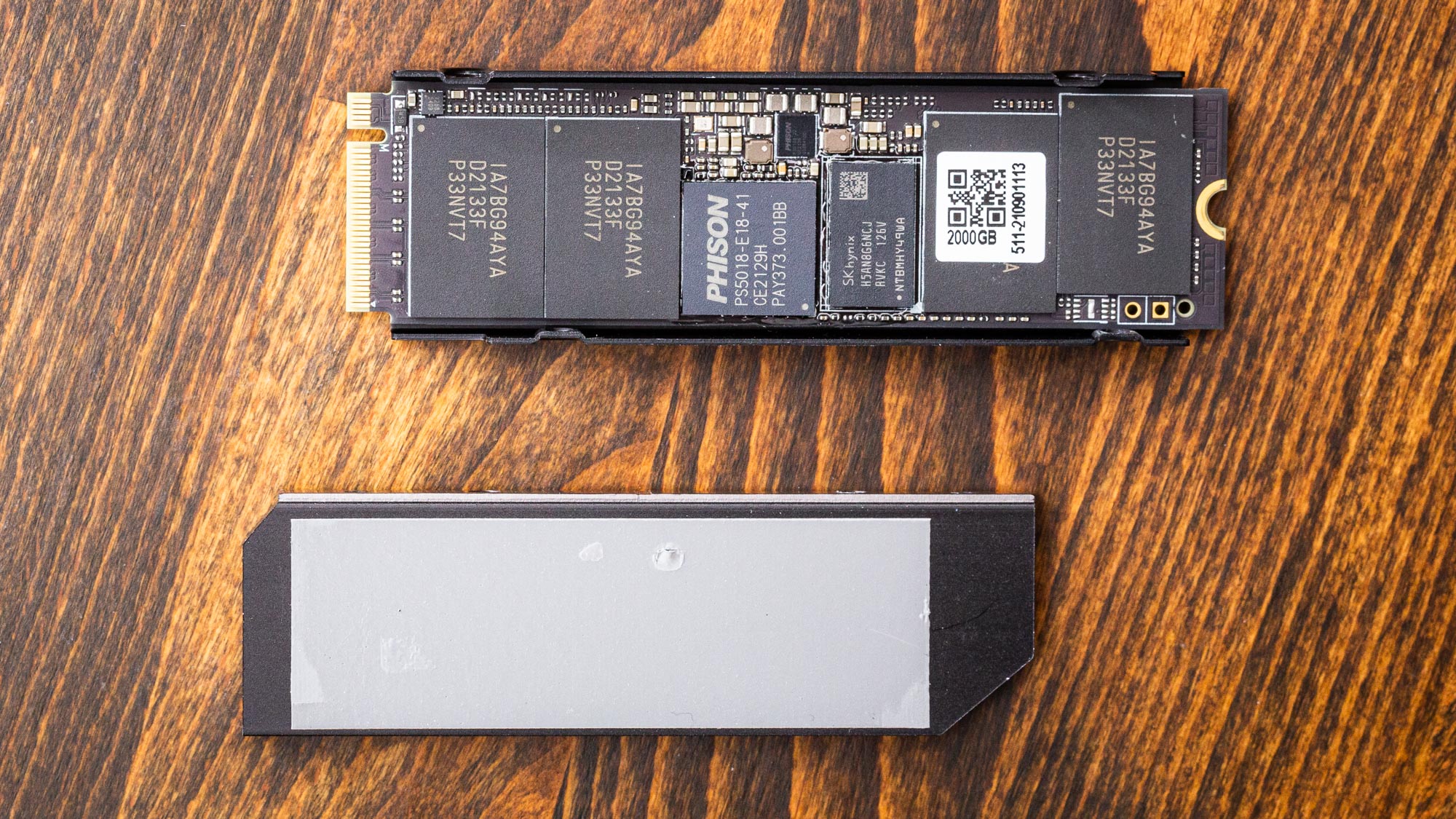
The XS70 utilizes the common M.2 2280 form factor, with an attractive, aluminum heatsink in black and silver. One complaint some enthusiasts have is that heatsinks are often more about looks than performance, meaning the design is not conducive to airflow. While many SSDs do not require a heatsink in the first place, high-end PCIe 4.0 drives can start to run quite warm, especially in poorly-ventilated environments or inside a console. This one gets the job done despite itself. SP claims it’s up to 40% cooler, but our testing has it running hotter than the Inland Gaming Performance Plus. The thermal padding also did not have quite as good contact.
Under the cover we see the traditional layout of four NAND packages, the controller, and DRAM cache, with the flash and DRAM likely mirrored on the back side.
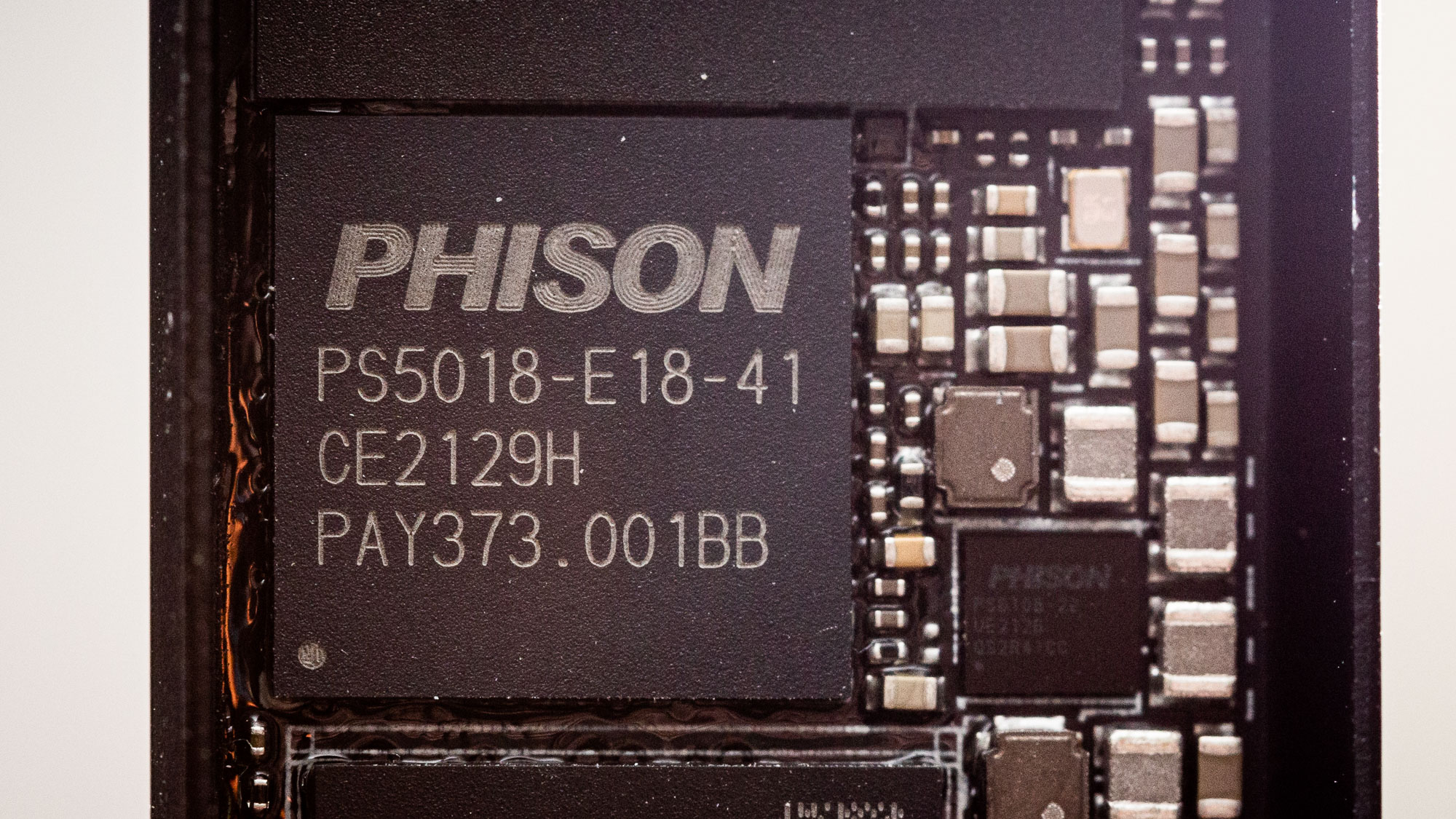

Phison’s E18 controller has appeared many times on our testbench. It’s a popular, if not the most popular, choice for high-end PCIe 4.0 drives. Phison took the consumer SSD market by storm with its E12 controller, and while we feel the E16 was a nice stop-gap solution — which has actually remained of at least niche use with the PS5 — the E18 really begins to push the envelope.
DRAM consists of SK hynix DDR4 in the 512M x 16b configuration, for a total of 2GB with two 1GB modules. We have seen older E12-based drives come with either DDR3 or DDR4, and many drives also had DDR3L or DDR4L as options. Effectively the difference here is in power consumption, keeping in mind that DRAM cache on a SSD is utilized for metadata storage and access. This means the latency advantage is most important, and “true latency” is a factor of both bandwidth, through clock speed, and native latency, the latter of which usually increases generationally. DRAM ICs also tend to support a range of speeds and latencies.
The flash is Micron’s 176-layer B47R TLC NAND which is being produced in good volume at this point. We will see competitor flash of this generation soon, even as flash manufacturers are already looking ahead. The QLC options in particular should be interesting. Regardless, Micron’s B47R remains the best consumer option on the market and it pairs excellently with Phison’s E18 controller. We have seen that in past reviews as it’s been compared to very similar drives utilizing Micron’s 96-layer B27B instead.
As with the Inland Gaming Performance Plus the flash is running at 1200 MT/s. This is not a hard limitation on the controller as Phison lists up to 1600 MT/s per channel on their data sheet for the E18. As flash tends to operate in an 8-bit mode this translates to 1600 MBps per channel maximum, given sufficient flash, although there’s significant overhead due to other bus data such as commands and addresses. This is especially true for write operations which require acknowledgement. In any case, it’s plenty of bandwidth to saturate four lanes of PCIe 4.0.
MORE: Best SSDs
MORE: How We Test HDDs And SSDs
MORE: All SSD Content

Shane Downing is a Freelance Reviewer for Tom’s Hardware US, covering consumer storage hardware.
-
tamalero Those prices looks really good. I hope this isnt part of the plan of doing a bait and switch like many NVME and SSD vendors have done lately.Reply -
Reply
You can expect that from almost every manufacturer of SSDs except perhaps the top-tier like Samsungtamalero said:Those prices looks really good. I hope this isnt part of the plan of doing a bait and switch like many NVME and SSD vendors have done lately. -
markmcg Reply
Dunno what you think affordable...but it is £330 on Amazon for 1TB 😒Admin said:We put the blistering-fast Silicon Power XPower XS70 SSD through its paces in our test regimen.
Silicon Power XPower XS70 SSD Review: Fast, Attractive, and Affordable : Read more
Unless you know different? 😏 -
tamalero Reply
And? just because others do, doesn't means its good.Mandark said:You can expect that from almost every manufacturer of SSDs except perhaps the top-tier like Samsung -
Reply
No I was just saying expect it and that you should stick with good manufacturers like Samsung. I never once said that it was goodtamalero said:And? just because others do, doesn't means its good. -
alceryes After researching a bit, I just pulled the trigger on this.Reply
SP is selling the 2TB version, through Amazon, for $169 USD. Hard to beat for the purported performance. I'll be taking the heatsink off since the motherboard I'm getting has a heatsink already. -
Pyrokinetic Buyer beware!Reply
Be warned - new XS70 2TB units no longer use the Phison E18 controller. Unit I just bought only scored 1976 in the 3dMark Storage Benchmark. Love the language on the website -- performance figures are "up to" figures of the E18 unit. Bait and switch losers - need to rename it something else.
